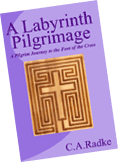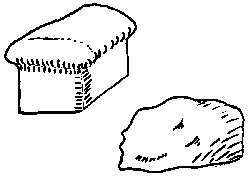Suggested Hymns from HymnSite.com
|
Follow the
Path
For Lent take 
This devotional book guides the reader on a pilgrim journey from creation to the resurrection, with a new devotion written for each day from Ash Wednesday to Easter Sunday. It follows the path of The Cross Labyrinth, and arrives at the foot of the cross on Easter morning. Be sure to follow Journey Notes, which are supplemental thoughts on hymns to accompany the pilgrim journey. Listen to short, daily podcasts, too. For more information about the book and finger labyrinths, visit The HymnStore or CrossLabyrinth.com. |
||||
| Scripture | Theme | Hymns | |||
|---|---|---|---|---|---|
| Joel
2:1-2, 12-17
or |
Calamity is not God's will for you
or Light and healing and glory come through righteous service to God |
181: Ye Servants of God 206: I Want to Walk as a Child of the Light 379: Blow Ye the Trumpet, Blow 396: O Jesus, I Have Promised 419: I Am Thine, O Lord |
|||
| Psalm 51:1-17 | God's judgment is justified; repentance is good for the soul | 355: Depth of Mercy 730: O Day of God, Draw Nigh |
|||
| Matthew 6:1-6, 16-21 | The treasure that counts is in heaven | 532: Jesus, Priceless Treasure 612: Deck Thyself, My Soul, with Gladness |
|||
| 2 Corinthians 5:20b-6:10 | Being the Lord's ambassadors on earth | 75: All People That on Earth Do
Dwell 88: Maker in Whom We Live 569: We've a Story to Tell to the Nations |
|||
Featured Hymn
Here, O My Lord, I See Thee
Words by Horatius Bonar
Music by Edward Dearle
Tune Name: PENITENTIA
This is the first day of Lent, a season of preparation and reflection leading to Easter. Two sets of stories from the life of Christ are often emphasized during this season. There are the stories of Christ's temptations in the wilderness, and there are wonderful stories about Holy Week, the final week before the resurrection. During this season of Lent, some of the featured hymns on this site will focus on each of the three temptations, some on the stories from Holy Week, and some on the Lectionary passages. I hope you will indulge me.
While He was in the wilderness, Christ was first tempted to change stones to bread. Christ responded with scripture, declaring, "Man shall not live by bread alone, but by every word that proceeds from the mouth of God." People have long known the pleasures of fine meals and feasts. These are temporal, though. The best that we can hope to enjoy in this life pales when compared to the feast that awaits us in God's heavenly kingdom. This week's featured hymn is a thoughtful reflection on communion written by Horatius Bonar. Read carefully and prayerfully the words of this hymn:
| 1. Here, O my Lord, I see thee face to face; here would I touch and handle things unseen; here grasp with firmer hand eternal grace, and all my weariness upon thee lean. |
| 2. This is the hour of banquet and of song; this is the heavenly table spread for me; here let me feast, and feasting, still prolong the hallowed hour of fellowship with thee. |
| 3. Here would I feed upon the bread of God, here drink with thee the royal wine of heaven; here would I lay aside each earthly load, here taste afresh the calm of sin forgiven. |
| 4. Too soon we rise; the symbols disappear; the feast, though not the love, is past and gone. The bread and wine remove; but thou art here, nearer than ever, still my shield and sun. |
| 5. Feast after feast thus comes and passes by; yet, passing, points to the glad feast above, giving sweet foretaste of the festal joy, the Lamb's great bridal feast of bliss and love. |
In His preparation for ministry, Christ fasted, giving up the pleasures that can distract us from a closer relationship with the Father. It was then, while Christ hungered for food, that Satan sought to take advantage of the weakness in Christ's frail, human body. For Christ, the temptation was a choice between physical and spiritual needs. He demonstrated His choice in His words and His actions.
We, too, can know the feast which brings love and power and redemption, but only when we have learned to follow Christ's example and truly crave the Word of God as our source of life. May the words of this week's hymn and the inner peace that we experience through communion on this Ash Wednesday inspire and guide us to focus on spiritual things, even as we minister to physical needs of those around us.
Horatius Bonar (1808-1889), lived in England. Along with his brother Andrew, he was involved in the 19th century evangelical movement. Between the two of them, Horatius was recognized as the hymn writer, and was also known to provide musical instruction to children of noble families. Some of his works were incorporated into the 1876 revision of John Wesley's Collection of Hymns for Use by the People Called Methodists. In a paper entitled Some hymns and hymn-books, which was read before the Cambridge University Congregational Society in the Easter term, 1924, Bernard L. Manning, M.A., a Fellow of Jesus College, Cambridge, discussed the relative merits of works by several writers, including Bonar. Bonar receives a short and rather pointed critique--"Less good than these [other hymn writers], as he is even more voluble, is Horatius Bonar, a useful, pedestrian sort of man who is never very good and not often very bad. He badly needs the pruning knife, but we may be grateful for `I heard the voice of Jesus say' and `O Love of God, how strong and true' and `Fill Thou my life, O Lord my God'."
Whether or not Manning would have used the "pruning knife" for this week's featured hymn, its focus on the bread from heaven, not on the stones of this earth, is a solid message to begin the Lenten season.
God bless you--
Lection at HymnSite.com
Links please
God bless you!
| Passages suggested are from The Revised Common Lectionary: Consultation on Common Texts (Abingdon Press, 1992) copyright © by the Consultation on Common Texts (CCT), P.O. Box 340003, Room 381, Nashville TN 37203-0003. Reprinted with permission of CCT. |
